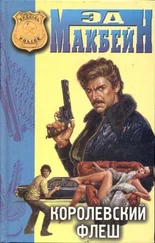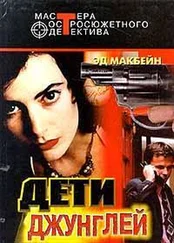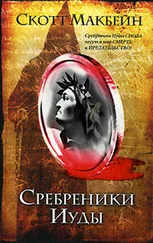The city in these pages is imaginary.
The people, the places are all fictitious.
Only the police routine is based on established
investigatory technique.
It was still snowing hard when she came out of the theater.
The snow, wind driven, struck her face sharply as she stepped into the alley and closed the stage door behind her. She glanced upward, shaking her head as though reprimanding God, and grimaced at the myriad tiny darts of white swirling in the reflected glow of the hooded light hanging over the door. Reflexively, she lifted the collar of her coat, and then yanked the muffler from around her throat and draped it over her head like a scarf. Holding the ends together just under her chin, she began walking toward the street at the end of the alley.
In this city, there were only two good seasons, and even they were sometimes lousy. Winter and summer, you could forget entirely; they were either too hot or too cold. Like this winter, which had started in November instead of when it was supposed to. London was worse, she supposed. No, London was better. Well, at least London was dependable; London was always lousy. Well, that wasn’t quite true, either. She could remember days, when she was living there — ah, those lovely balmy summer days, strolling up Piccadilly, blonde ponytail swishing behind her, nineteen years old then and worlds ahead to conquer. Summertime in London.
The snow underfoot was at least a foot deep.
Luckily, she had decided to put on boots before leaving her apartment for the performance tonight, not because she was expecting snow — the snow hadn’t begun until sometime after the curtain went up — but only because it was so damn cold. The boots afforded at least some protection. They were shin-high, her blue jeans and leg warmers tucked into them, her long gray cavalry officer’s coat coming almost to their leather tops. There wasn’t a taxicab in sight. Naturally. This city. She had lingered too long in the dressing room, leisurely cold-creaming off her makeup, getting out of the silver-spangled costume all the dancers wore for the finale, and then into her sweater, jeans, socks, leg warmers, and boots. She’d made her big mistake in listening so long to Molly. Molly was having trouble with her husband again. Molly’s husband was an unemployed actor who seemed to hold her responsible for having landed a part in a hit musical while he was still running around town auditioning. Never mind that Molly’s weekly salary paid the rent and put food on the table. Never mind that Molly, like all the gypsies in the show, busted her ass doing complicated routines six nights a week, not to mention Wednesday and Saturday matinees. Molly’s husband kept railing at her, and in the dressing room Molly kept repeating his angry tirades, and it was all you could do to get out of there by 11:00 if you weren’t careful. It was twenty past 11:00 now; Molly had gone on forever.
All the cabs had been snatched up by audiences pouring out into the night when the shows broke all up and down the street. She could either walk north to Lassiter and hope to catch an uptown bus on the corner there, or she could walk south to the Stem, and then four blocks east to the subway station, where she could catch an uptown train. The avenue bordering the theater on the north was perhaps the roughest in the entire city, thronged with hookers and pimps at all hours of the day, but especially after dark. Besides, with this snow, would the buses be running on schedule? No, the subway would be best.
When she reached the brightly lighted Stem, however, she was surprised to find that it was still crowded with people, despite the rotten weather. She stood on the street corner for a moment, debating whether it wouldn’t be simpler just to walk home. She lived only ten blocks from the theater. If she took the subway, it meant walking the four blocks to the station, and then another block to her apartment building when she got off the train. Besides, would the subway be safer than the Stem at this hour of the night?
She decided to walk.
She walked with a dancer’s peculiarly duck-footed waddle. She had been a dancer ever since she was nine — sixteen years now — including four years of study at the Sadler’s Wells in London. She had been living then with an oboe player, a young man who could never understand why dancers looked so graceful onstage and so oddly awkward off. Walking duck-footedly, but briskly, she smiled at the memory, and thought again of London, and longed idiotically for the wet and gloomy winters there — winters without the stubborn cold that held this city in its icy grip for months on end. This was February. Spring was only a bit more than a month away. But where was it? She paced herself as if she were doing a routine, head ducked against the wind and the snow, so many strides to the corner, so many strides to the corner after that, pause there for the traffic light — five six seven eight — striding out again, the tails of her gray coat flapping in the wind, the snow swirling around her, the blinking lights on the rooftop billboards flashing palely through the fierce sharp flakes.
It was ten minutes to midnight when she reached her own corner.
She turned left at the familiar phone booth, banked with snow now, and began walking toward her building in the middle of the block.
In this city, the neighborhoods changed rapidly. Ten blocks farther downtown, it would have been extremely dangerous to stand on a street corner waiting for a bus at this time of night. But here, only half a mile uptown from the theater, the block between the Stem and Lassiter was a safe, secluded enclave of juxtaposed brownstones, high-rises, and small shops. Her own building was midway between the two avenues. The shops, at this hour, were shuttered and dark. She passed the streetlamp two buildings down from her own and was approaching her own building when the man stepped out of the shadowed doorway to the service entrance.
Her head was still ducked against the blinding snow; at first, she only sensed his presence. She stopped. He was holding a gun in his hand. She knew only sudden lurching terror. She opened her mouth to scream, or to plead, or to shout for help, but the gun exploded and she felt a searing sensation below her left breast, and then she fell over backward onto the sidewalk, into the snow, blood bubbling from the wound and soaking the gray cavalry officer’s coat.
He stood over her.
He glanced briefly over his shoulder.
He leveled the pistol at her head then and fired two shots directly into her face.
The girl lay wet and gray and red against the white snow.
The snow was still falling. A patrol car was angled in against the curb, its blinking red dome lights flashing red onto the redstained snow around the girl. Two detectives from Midtown East stood looking down at the dead girl. Behind them, the two patrolmen who’d first responded to the call were putting up wooden police barricades and cardboard CRIME SCENE placards. One of the detectives was named Henry Levine, and he had been working for the police department since he was twenty-one. He was now forty-six. He looked down at the dead girl’s shattered face without blinking. His partner was twenty-eight years old. He had been a cop for six years, and had only recently been promoted to detective/3rd grade. The plastic-encased card clipped to the lapel of his overcoat identified him as Ralph Coombes. In the color photograph behind the plastic, he looked like a teenager.
“I never saw anything like this in my life,” he said.
“Yeah,” Levine said.
“Did you?”
“Yeah,” Levine said. He looked over his shoulder to where the two patrolmen were working on the barricades. One of the wooden crossplanks refused to seat itself properly on the sawhorses. The patrolmen were swearing.
Читать дальше









